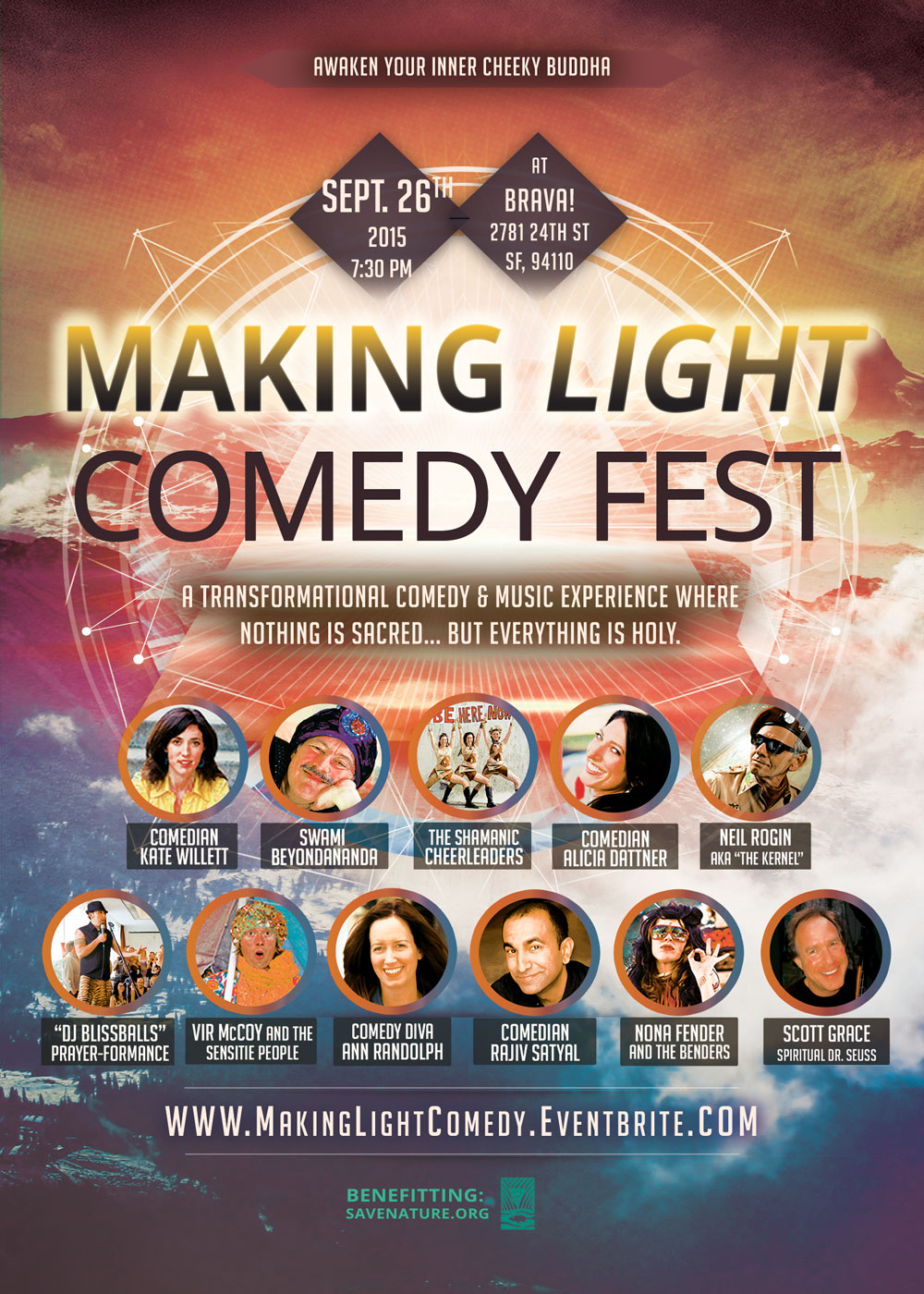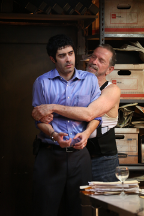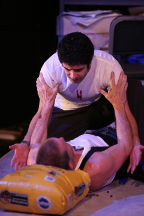Comedy seems to me to be an amazing cultural phenomena. In what other segment of the natural world do we see “comedy” other then in human beings? Not just that, how far along in cultural development does a culture have to be so that it can support a whole class of specialists whose job it is is to be “funny”? And what is that, exactly — “funny”?

So I think the closest endeavour to “comedian” is probably “shaman.” Any culture advanced enough to support shamans can probably support comedians.
But what about being “funny” — what is that? What was it about the comedians who performed at the “Making Light Comedy Fest” that made them funny? I think it’s perspective.
Now my perspective was that I was in the second row and the stage was right in front of me so what I saw when I kept my head neutral was Alicia Dattner’s knees. So that’s my view of Alicia Dattner, she has great knees. Some of the the other performers were taller, so I got familiar with their shins. Of course when I tilted my head a bit I could see a more complete person. That’s kind of funny, isn’t it?
Anyway, perspective: when Swami Beyondananda says that “In the future time will be a thing of the past” the juxtaposition of the rational words and the irrational context is funny. When DJ Blissballs strings together every possible new age cliché ever known into one long Wagnerian prayer cycle — it’s funny. Kate Willet’s discussion of the cultural and biological issues of sex at Burning Man — a microcosm of gender relations without the inertia and confines of day-to-day life — is funny. Ann Randolph’s allusions to the business cycle of fellatio as seen by a crack addict, as well as personal hygiene issues that go along with addiction, is funny. When Scott Grace invokes Dr. Suess’s whimsical style as a wisdom-rap-anthology of our angst ridden culture, it’s funny. Just to name a few.
The juxtaposition of the familiar rational with the unexpected irrational — the mixing and juggling of contexts — is funny. Along with the insights, the metaphors and innuendos. We recognize the connections of things that are not usually connected. And it’s funny.
Every one of these people were funny. But not just “funny”, but so out of the ordinary that we need a word that describes a larger magnitude of “funny” — let’s say hilarious.
And when something is “funny,” we laugh. We are lost in the moment, tensions are released, and we feel better. And even after the laughter is over, we can enjoy a sense that we know something more about who we are. We change our perspective, just a little, here and there, and we can see the world differently.
Thanks to all the comedians who performed. It was a great evening.



Nick Gandiello’s “The Wedge Horse”: notes and comments
I’m going to recommend you see a play that I haven’t seen — in fact I’m going to strongly recommend you see it. And I’m not going to tell you what it’s about. I know what it’s about because I’ve read it. But I won’t tell you.
The play is “The Wedge Horse” and it’s at the Fault Line Theater in NYC. And you should go see it.
I will tell you that I’m familiar with Nick’s work. A couple of years back I attended a reading of Nick’s “Black Fly Spring” — a powerful piece of work about love and grief and self-deception. The play (at that time) needed development. Some of the characters were not as transparent as they could be, and the work deserves to be completely clear. Because above all Nick wants to audience to get the play, to go with the characters where they are going, to see the world from their eyes.
I will tell you “The Wedge Horse” is a powerful, beautiful piece of work. The characters are so human — stubborn, willful, strong, needy. They are fragile, and they suffer. And they struggle to find their balance. They are full of compassion. And deception and heroism. They will break your heart — and give you tremendous hope.
And that’s the reason to go: because Nick is writes about people in a way that makes them seem so real — all the trivial mundane silliness mixed up with all the glorious marvelous aspirations to heaven and passion and oneness. And he’s barely out of high school.
He delivers compassion and insight — and he’s not fully grown. He’s perhaps 30, looks younger. He’s a child — a kid. And he’s writing with the kind of insights that strong mature adults possess. This young man — this KID — is the real deal. He works hard at his craft. He teaches others. He celebrates the accomplishments of others. He suffers for his sanity. You can tell this by the way he writes. No one as young as he is should be able to write the way he writes. But he does. He aspires to greatness. And he wants you to go with him.
You should go see “The Wedge Horse” because you will get in on the ground floor of a talent that has the strength to get there –the there all writers want to get to — not just to be successful, but relevant. He’s going to go to the the place where compassion and wisdom exist — and he wants you to go there with him.
A playwright’s playwright, who writes in a way that is accessible to everyone. I’ve never met him. No go see his play.